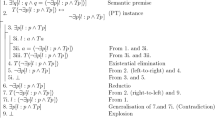Abstract
The article is part of a symposium on Hartry Field’s “Saving truth from paradox”. The book is one of the most significant intellectual achievements of the past decades, but it is not clear what, exactly, it accomplishes. I explore some alternatives, relating the developed view to the intuitive, pre-theoretic notion of truth.
Similar content being viewed by others
References
Burgess, J. (1992). Proofs about proofs: A defense of classical logic. In M. Detlefsen (Ed.), Proof, logic and formalization (pp. 8–23). London: Routledge Publishing Company.
Chihara, C. (1979). The semantic paradoxes: A diagnostic investigation. Philosophical Review, 88, 590–618.
Chihara, C. (1984). The semantic paradoxes: Some second thoughts. Philosophical Studies, 45, 223–229.
Eklund, M. (2002). Inconsistent languages. Philosophy and Phenomenological Research, 64, 251–275.
Field, H. (1994). Disquotational truth and factually defective discourse. Philosophical Review, 103, 405–452.
Field, H. (2004). Truth and the unprovability of consistency. Mind, 115, 567–605.
Field, H. (2009a). Pluralism in logic. Review of Symbolic Logic, 2, 342–359.
Field, H. (2009b). What is the normative role of logic? In Proceedings of the Aristotelian Society (Suppl. Vol. 83, pp. 251–268).
Kripke, S. (1975). Outline of a theory of truth. Journal of Philosophy, 72, 690–716.
Priest, G. (1987). In contradiction: A study of the transconsistent. Dordrecht: Martinus Nijhoff Publishers; 2nd revised edition, Oxford: Oxford University Press, 2006.
Scharp, K. (2007a). Replacing truth. Inquiry, 50, 606–621.
Scharp, K. (2007b). Aletheic vengeance. In J. C. Beall (Ed.), The liar’s revenge (pp. 272–319). New York: Oxford University Press.
Tarski, A. (1933). Der Warheitsbegriff in dem formalisierten Sprachen. Studia philosophica, 1, 261-405; translated as The concept of truth in formalized languages, in J. Corcoran & A. Tarski (Eds.), Logic, semantics and metamathematics (pp. 152–278). Oxford: Clarendon Press; 2nd ed. Indianapolis: Hackett Publishing Company, 1983,
Waismann, F. (1951). Analytic-synthetic III. Analysis, 11, 49–61.
Waismann, F. (1968). Verifiability. In A. Flew (Ed.), Logic and language (pp. 117–144). Oxford: Basil Blackwell.
Weir, A. (1998). Naïve set theory is innocent. Mind, 107, 763–798.
Acknowledgments
Many thanks to Hartry Field, Vann McGee, and Kevin Scharp for reading a draft of this study and providing helpful remarks and discussion.




